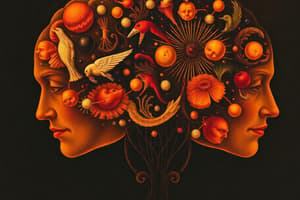Podcast
Questions and Answers
What is mental age defined as?
What is mental age defined as?
- The age at which a child reaches intellectual disability
- The average age of adults in a population
- Chronological age that corresponds to a given level of performance (correct)
- The age at which a person becomes socially mature
Who adapted the Binet’s test for American school children and extended its age range?
Who adapted the Binet’s test for American school children and extended its age range?
- William Stern
- David Wechsler
- Carol Dweck
- Lewis Terman (correct)
Which formula represents the calculation of Intelligence Quotient (IQ)?
Which formula represents the calculation of Intelligence Quotient (IQ)?
- IQ = mental age / chronological age x 100 (correct)
- IQ = chronological age - mental age
- IQ = mental age + chronological age
- IQ = 100 / (mental age x chronological age)
What is an essential characteristic of a psychological test?
What is an essential characteristic of a psychological test?
What does the Flynn effect refer to?
What does the Flynn effect refer to?
How is the reliability of a test defined?
How is the reliability of a test defined?
What is a fixed mindset according to Carol Dweck?
What is a fixed mindset according to Carol Dweck?
What is the condition defined as having limited mental ability?
What is the condition defined as having limited mental ability?
Which of the following concepts highlights a self-confirming concern about being evaluated based on a negative stereotype?
Which of the following concepts highlights a self-confirming concern about being evaluated based on a negative stereotype?
Which factor is believed to influence cognitive development according to the content provided?
Which factor is believed to influence cognitive development according to the content provided?
In the context of intelligence, what is the concept of 'factor analysis'?
In the context of intelligence, what is the concept of 'factor analysis'?
Which of the following is NOT a primary mental ability identified by L.L. Thurstone?
Which of the following is NOT a primary mental ability identified by L.L. Thurstone?
What is the difference between 'fluid intelligence' and 'crystallized intelligence'?
What is the difference between 'fluid intelligence' and 'crystallized intelligence'?
Which intelligence theorist argued for the existence of multiple intelligences, rather than a single general factor?
Which intelligence theorist argued for the existence of multiple intelligences, rather than a single general factor?
What is the primary focus of 'analytical intelligence,' as defined by Robert Sternberg?
What is the primary focus of 'analytical intelligence,' as defined by Robert Sternberg?
Which of the following is the best example of 'practical intelligence'?
Which of the following is the best example of 'practical intelligence'?
What is the main difference between 'aptitude tests' and 'achievement tests'?
What is the main difference between 'aptitude tests' and 'achievement tests'?
Which of the following is NOT a characteristic of the early intelligence testing methods pioneered by Francis Galton?
Which of the following is NOT a characteristic of the early intelligence testing methods pioneered by Francis Galton?
Flashcards
Intelligence
Intelligence
The ability to learn from experience, solve problems, and adapt using knowledge.
Factor Analysis
Factor Analysis
A statistical method that identifies clusters of related items on a test, revealing underlying abilities.
General Intelligence (g factor)
General Intelligence (g factor)
A single underlying factor that contributes to all mental abilities, measured by every task on an intelligence test.
Crystallized Intelligence
Crystallized Intelligence
Signup and view all the flashcards
Fluid Intelligence
Fluid Intelligence
Signup and view all the flashcards
Savant Syndrome
Savant Syndrome
Signup and view all the flashcards
Emotional Intelligence
Emotional Intelligence
Signup and view all the flashcards
Intelligence Testing
Intelligence Testing
Signup and view all the flashcards
Intelligence Quotient (IQ)
Intelligence Quotient (IQ)
Signup and view all the flashcards
Intelligence Test
Intelligence Test
Signup and view all the flashcards
Flynn Effect
Flynn Effect
Signup and view all the flashcards
Reliability
Reliability
Signup and view all the flashcards
Validity
Validity
Signup and view all the flashcards
Content Validity
Content Validity
Signup and view all the flashcards
Predictive Validity
Predictive Validity
Signup and view all the flashcards
Growth Mindset
Growth Mindset
Signup and view all the flashcards
Fixed Mindset
Fixed Mindset
Signup and view all the flashcards
Stereotype Threat
Stereotype Threat
Signup and view all the flashcards
Study Notes
Intelligence Concepts
- Intelligence is the ability to learn from experience, solve problems, and adapt using knowledge.
- Factor analysis is a statistical method identifying clusters of related items on tests, revealing underlying dimensions of performance.
- Charles Spearman linked factor analysis to general intelligence (g factor), a universal mental ability.
- L.L. Thurstone conducted extensive testing, finding seven clusters of primary mental abilities (also using factor analysis).
- Howard Gardner proposed multiple intelligences, suggesting different types of intelligence exist.
- Robert Sternberg identified three main intelligences: analytical, creative, and practical.
Intelligence Theories
- Cattell-Horn-Carroll (CHC) Theory bridges fluid and crystallized intelligence.
- Crystallized intelligence is accumulated knowledge and verbal skills, increasing with age.
- Fluid intelligence is the ability to reason quickly and abstractly, decreasing in late adulthood.
- Savant Syndrome: A condition where seemingly limited mental ability coexists with exceptional skill (e.g., computation, drawing).
Types of Intelligence
- Analytical intelligence involves solving well-defined problems with single correct answers.
- Creative intelligence involves adapting to novel situations and generating ideas.
- Practical intelligence addresses everyday, ill-defined tasks with multiple solutions.
- Emotional intelligence involves perceiving, understanding, managing, and using emotions.
Assessing Intelligence
- Intelligence tests assess mental aptitude, comparing individuals' performance with others using numerical scores.
- Aptitude tests predict future performance, learning capacity.
- Achievement tests reflect acquired knowledge.
- Francis Galton explored hereditary genius, proposing measures like reaction time and sensory acuity as indicators of intelligence.
- Alfred Binet developed questions to determine a child's mental age.
- Lewis Terman adapted Binet's test for American children, creating the Stanford-Binet.
- William Stern introduced the intelligence quotient (IQ): Mental Age / Chronological Age x 100 (initially for children).
- David Wechsler developed the Wechsler Adult Intelligence Scale (WAIS) and Wechsler Intelligence Scale for Children (WISC), widely used, and considered less biased than earlier tests.
Test Design Principles
- Standardizing involves testing procedures, using comparison groups to develop meaningful scores (normal curve).
- Reliability refers to a test's consistent results—split-half, test-retest, different forms.
- Validity refers to a test's accuracy in measuring what it intends to measure (content, predictive).
Intelligence and Development
- Longitudinal studies track the same individuals over time.
- Cross-sectional studies compare different age groups at one point in time.
- Flynn effect refers to observed increases in intelligence test scores over time and across cultures.
Related Conditions and Concepts
- Intellectual disability is a condition of limited mental ability.
- Stereotype threat refers to self-confirming concerns about negative stereotypes impacting performance (e.g., African Americans, women).
- Carol Dweck highlights growth and fixed mindsets related to intelligence.
General Intelligence
- It is the overall ability to learn and solve problems
- It is measured through different tests such as the Stanford-Binet and WAIS
Studying That Suits You
Use AI to generate personalized quizzes and flashcards to suit your learning preferences.




